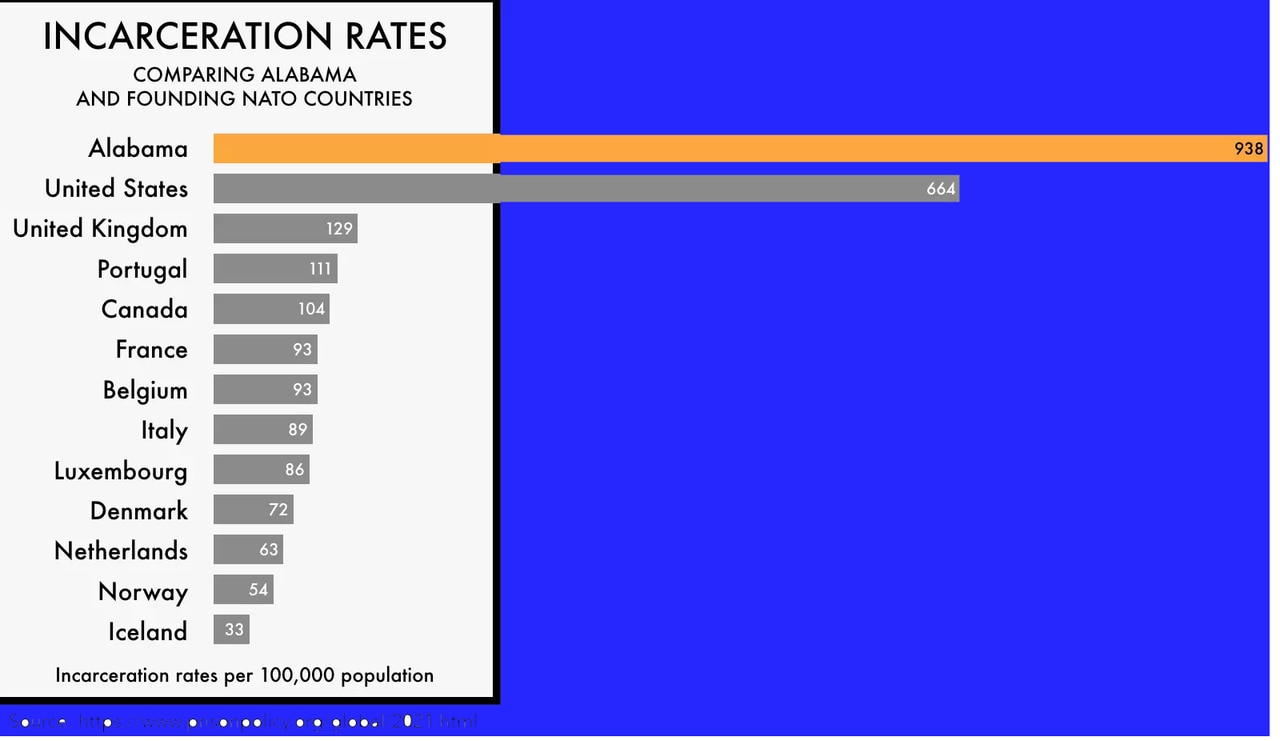Archibald: One nation, under arrest
This is an opinion column.
Things to think about.
In the 60 year period from 1960 to 2020, Alabama averaged 418 homicides a year.
About one killing every 21 hours.
There have been a few dips and spikes, but overall the numbers have remained between 250 and 577 since Ike was president. Even as the population of the state grew by 50 percent in that time.
1960: 406 killings
1970: 404 killings
1980: 509 killings
1990: 467 killings
2000: 329 killings
2010: 275 killings
2020: 471 killings
It’s too many, of course. But it’s not the crime wave some would have you believe.
The homicide rate – the number of killings per 100,000 people – fell by a third in those years. Yet the number of Alabamians locked in state and federal prisons – not even counting the 14,000 in local jails – has risen 429 percent since 1960.
Our state, our country, is defined internationally by the way we lock people up.
The Prison Policy Initiative argues that if you include prisons, jails, juvenile detention and immigration facilities, the state of Alabama holds 938 out of every 100,000 Alabamians.
It has a higher rate of incarceration than Rwanda or Cuba, according to the World Population Review. It’s higher than Thailand or Panama or the country with the highest incarceration rates in the world: The U.S.
There are different ways of measuring these things. But in all of them America comes off as the land of the free and the home of the cage.
If you add up the number of people imprisoned in India, Russia, Thailand, Turkey, Mexico and Iran, you still wouldn’t reach the 2,068,800 people locked up in the U.S. in 2021, according to World Prison Brief.
We are an incarceration nation. And Alabama is just fine with that.
In terms of actual inmate numbers, Alabama’s state prison population alone – 20,904 in custody this summer – was higher than Honduras or Libya or Paraguay or Israel or Ghana or – on and on and on. You get the picture.
Alabama is not the worst state (thank God for Louisiana and a few others), but if it were a country unto itself, as the Prison Policy Initiative put it, Alabama would lock up “a higher percentage of its people than any democracy on earth.”
Which is a helluva statement.
Alabama has more people in prison than it has cops or lawyers or farmers. More than it has minority- or women-owned business with employees — combined. Almost as many people are incarcerated in the state than have died of COVID.
RELATED: More columns by John Archibald
Alabama probably even has more people in prison than it has politicians willing to sell their souls for votes and power and money. And that’s saying something.
It all carries a hefty price tag. Last month the Alabama Corrections Institution Finance Authority gave the green light to spend $1.08 billion – with a B – for a single new prison in Elmore County. Lawmakers had planned to build two behemoth prisons for just a little more than that. But they are going to need more of your money to get it done.
RELATED: Trump Justice Department says Alabama prisons are unconstitutional
As for treatment within those buildings, Alabama has agreed to spend yet another billion dollars on a prison healthcare contract with a company called YesCare, despite complaints about the bid process and the fact that the company – previously known as Corizon – faced more than 1,000 lawsuits that resulted in millions of dollars in payouts.
RELATED: Business Insider details prison health giant’s ‘Texas two-step”
We’re talking multiple billions of dollars here. Not because the world is more dangerous than it used to be, because it’s arguably not. We’re paying fortunes – multiple millions to a lawyer named Bill Lunsford who has made an empire out of defending prisons in Alabama and elsewhere from indefensible behavior – because the $80 billion-a-year incarceration business is just too big to fail.
As Alabama crowds people into prisons that are already overcrowded (even the Trump Justice Department called them unconstitutional), the Alabama Parole Board, led by former prosecutor Leigh Gwathney, denies nine out of every ten eligible parolees a chance at new life, regardless of health or condition or circumstance or staff recommendation. The ACLU monitored all parole hearings through June and July, and found that Gwathney opposed parole in more than 97 percent of all the cases that came before her.
In Alabama and America we too often talk of putting people in prison, in often terrible circumstances, as a matter of law and order and justice.
But it looks an awful lot like a business decision, or a political one. Please don’t mistake that for justice.
John Archibald is a two-time Pulitzer winner for AL.com. See more of his work here.
